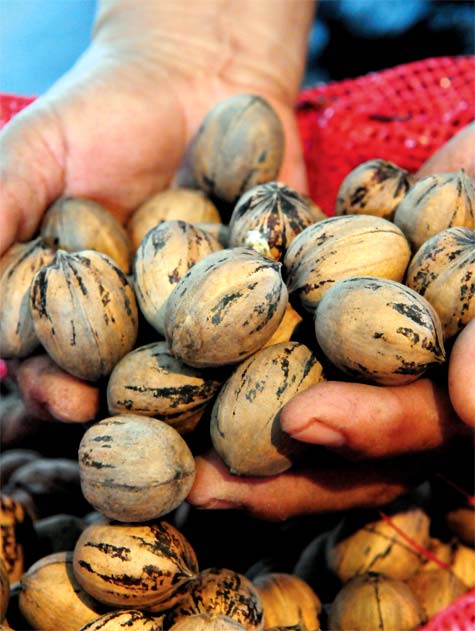
Photo by Carole Topalian
hat food grows on the Texas state tree, is pivotal to the Thanksgiving Day feast, and is a highly prized commodity in China? While the first two parts of the question may be obvious, the third is certainly more surprising.
The pecan tree is indigenous to Texas. And since the trees thrive in hot, humid summers, it’s not surprising that our state is a major producer. But as much as we Texans love our pecans, China is fast becoming one of the world’s biggest consumers.
Beginning around 2007, with the emergence of a wealthier middle class and increased knowledge about the health benefits of eating nuts, the Chinese market for pecans began to grow. That year also marked a sharp rise in the price of walnuts, a nut initially favored by the Chinese. But after giving pecans a try, the Chinese were hooked. The demand for them peaks during the country’s Mid-Autumn Festival and the Chinese New Year festivities.
The United States produces about 80% of the world’s pecans, the majority of which comes from Texas, Georgia and New Mexico. In 2003, the Chinese imported approximately 835,500 pounds of pecans. By 2009, it had risen to 83 million pounds, about 27% of U.S. production.
China’s love affair with pecans has been a boon for larger U.S. growers, who are planting more trees to meet the demand. But it has caused a major price increase for domestic consumers and commercial snack producers and bakers like Collin Street Bakery in Corsicana, whose famous fruitcake is a staple during the holidays. Because Chinese exporters frequently deal directly with growers, it has also meant increased competition for pecan distributors and shellers, like Corsicana’s Navarro Pecan Company.
For those whose orchards aren’t large enough to export nuts, the focus is still on the local consumer. Mike Sage of Sunnyvale Farms in East Dallas County has a ten-acre orchard where customers are invited to come and gather their own. Regarding the China phenomenon, he does say that the number of local Asian families visiting the orchard has grown substantially over the last five years. “It is definitely a family affair. Multiple generations come and bring their lunch and spend several hours gathering nuts and enjoying each other’s company.”
Last year’s drought had a major impact on the Texas pecan crop but this year the conditions look better. Pecans are generally ready for harvest around the first week of November. Sage notes that, “The last two years were not great harvests. In fact, in 2010, we sold out our crop in five days. But this year should definitely be better. We’re looking forward to having people come out for a much longer season.” Popular pecan varieties in North Central Texas include the Pawnee, Choctaw, Wichita and the Desirable. They’re hybrids, as native pecans tend to need more water than we get in this area. All of these varieties are known as “paper shell pecans” because of the ease of cracking their shells.
Jim Luscombe of Foster Crossing Pecans in Anna, explains the picking process. “We use tools to shake the trees so the pecans fall. When you come, you get a bucket to pick them up.” Many orchards will crack pecans for you, for a small fee per pound. Luscombe offers some tips on getting the best results at the cracking machine. “The pecans need to be dry. Crack a few nuts and snap the meat halves to see if they’re crisp.”
“The last two years were not great
harvests. In fact, in 2010, we sold out
our crop in five days. But this year
should definitely be better.”
The next step: size the nuts, since cracking machines are set for small, medium and large. Your pecans will be weighed before cracking with this year’s price expected to be about $5.00 per pound. Choose- Crack-Shell-Blow: the machine removes shells and about two-thirds of hulls. You should expect about a 50% drop in weight, post shelling. Shelled pecans stay fresh in the fridge for six months or up to two years in the freezer.
Foster Crossing Pecans
fostercrossingpecans.com, 214 -458-4107
Sunnyvale Pecan Orchard
e-pecan.org , 972-226-1251
Navarro Pecan Company
navarropecan.com
PENNY RUEKBERG is a professional freelance writer based in Dallas. She has written for numerous local magazines, including Richardson Living and The Texas Jewish Post as well as for numerous regional and national publications. She is also an enthusiastic amateur cook and a fan of good food.











